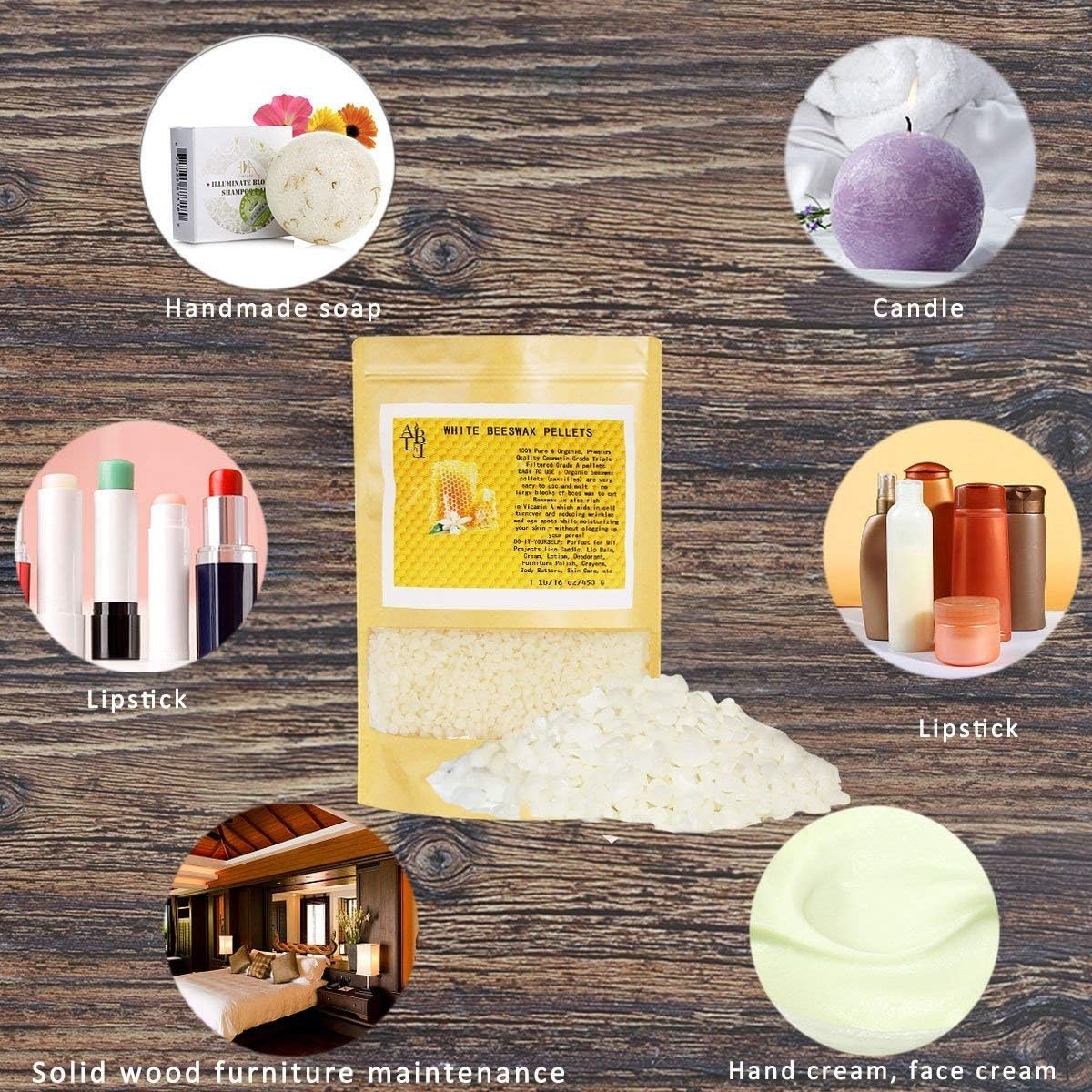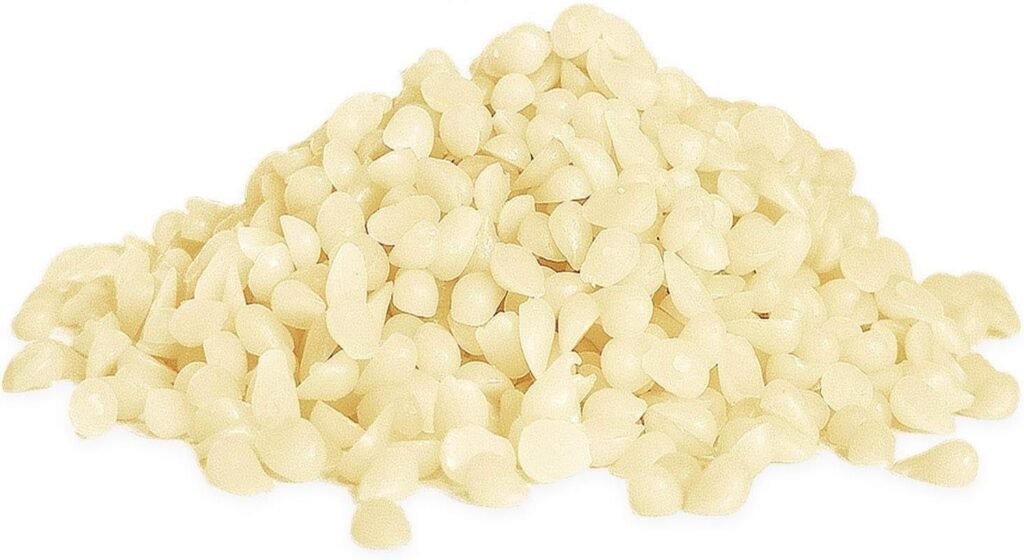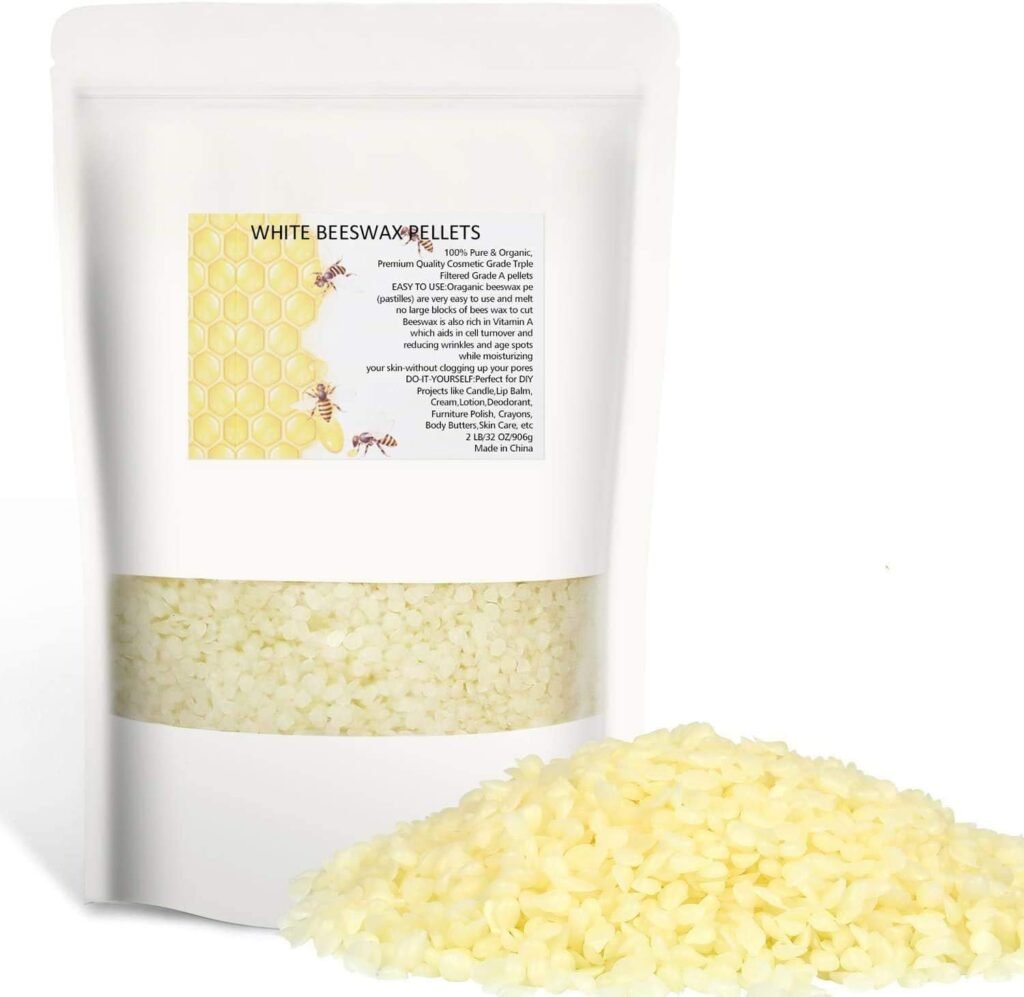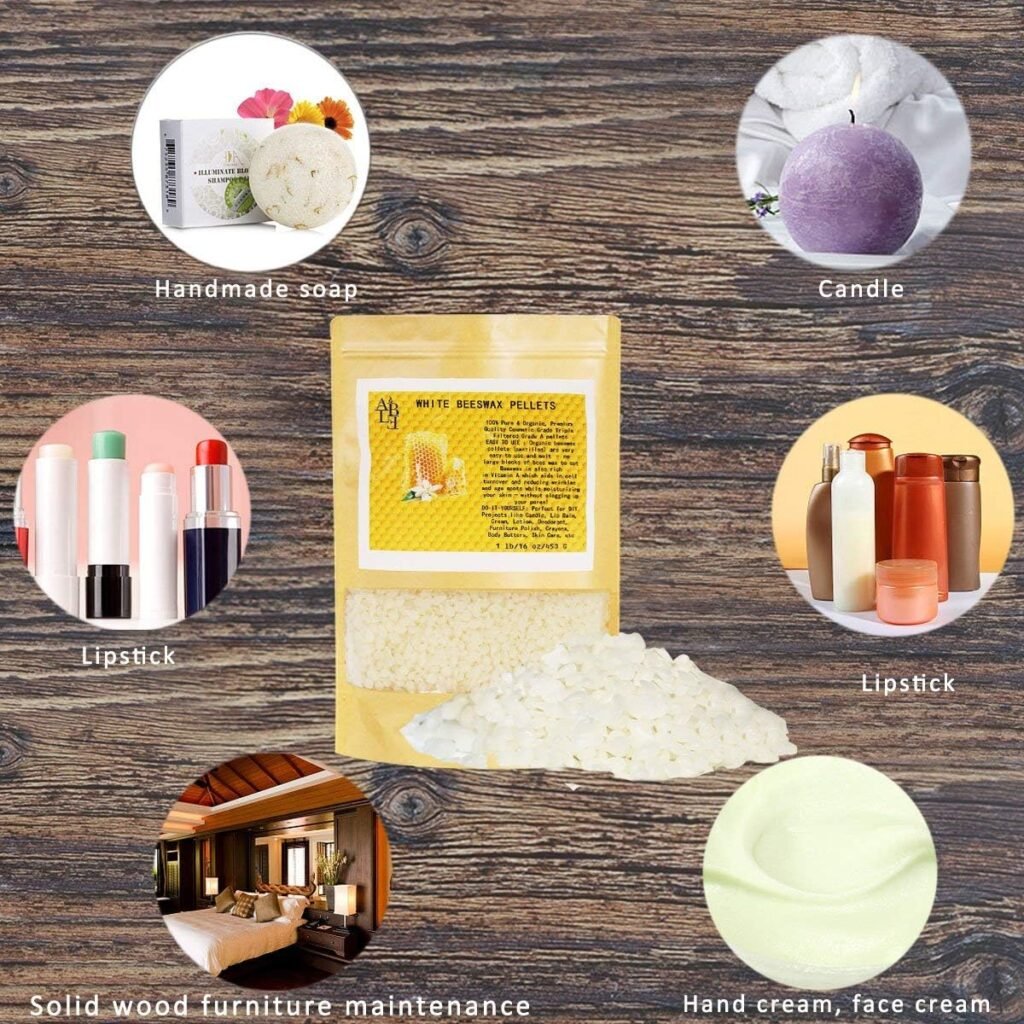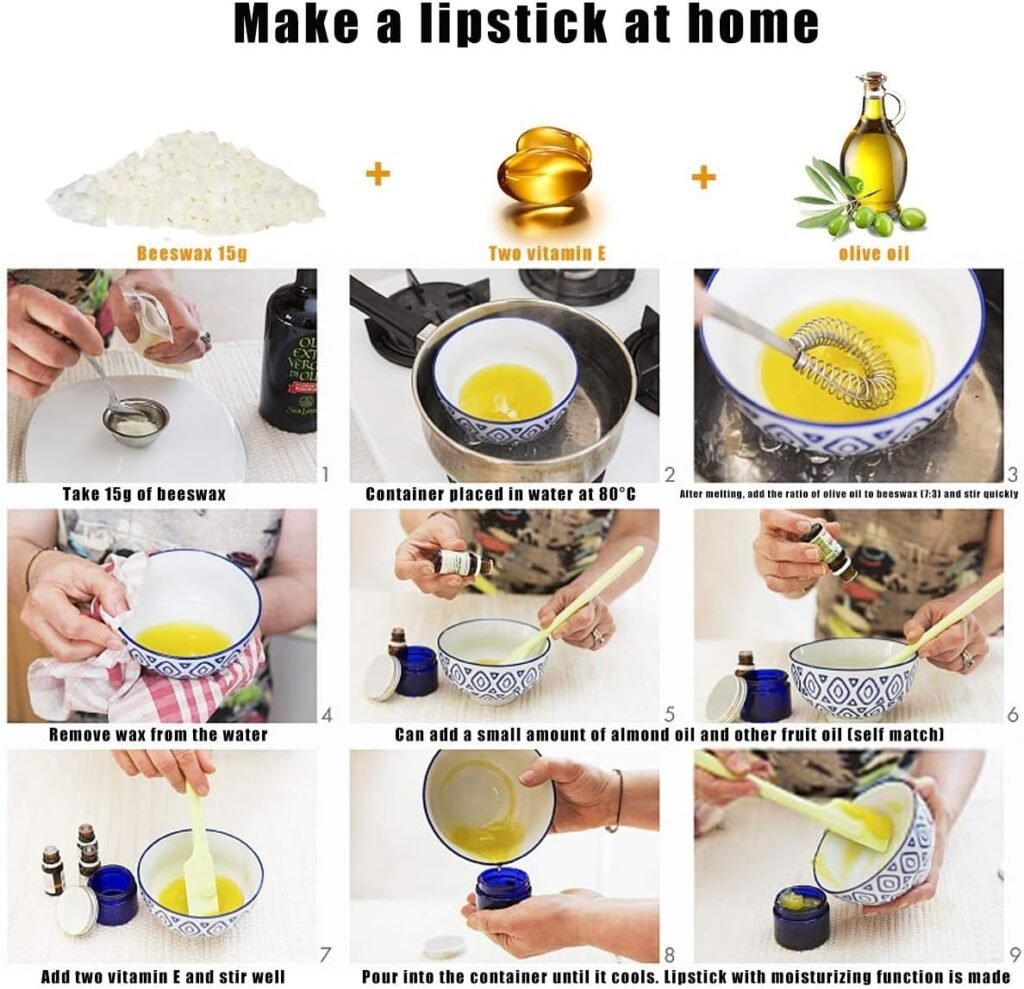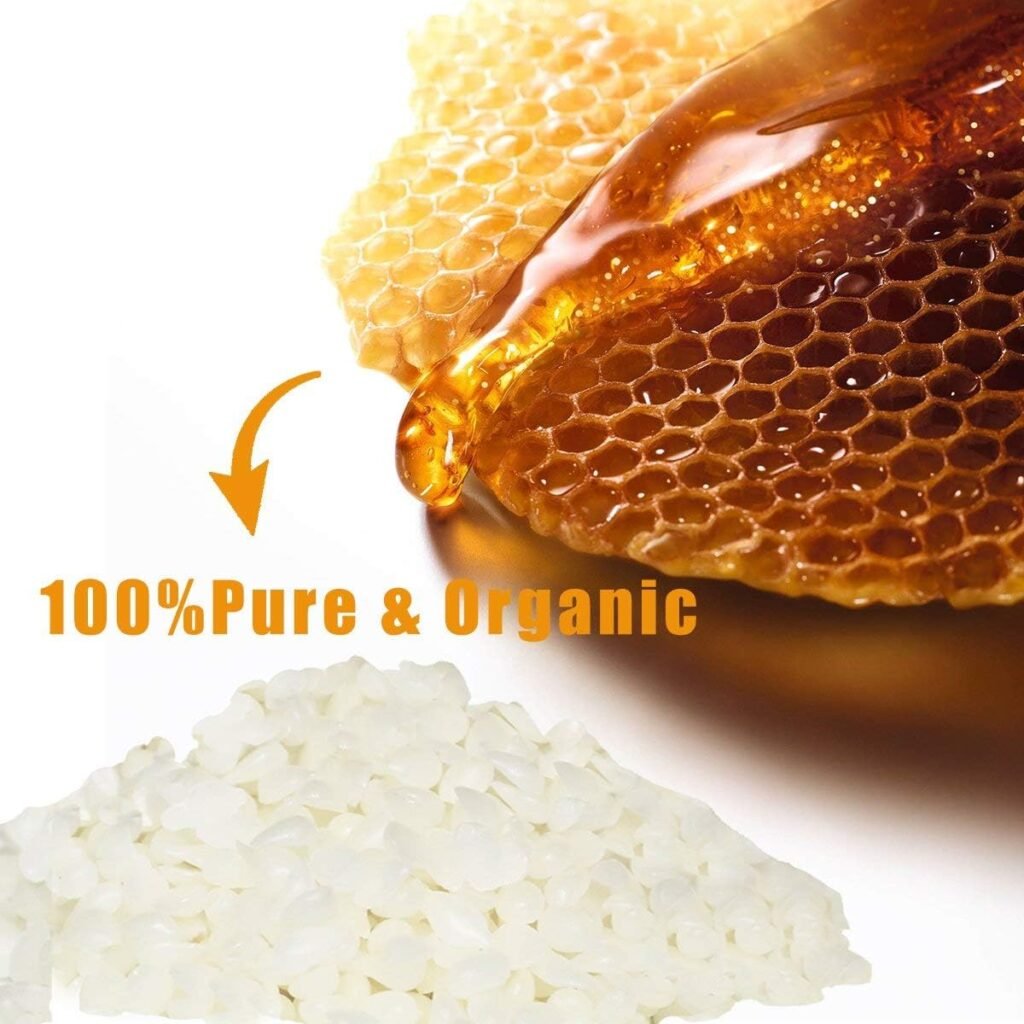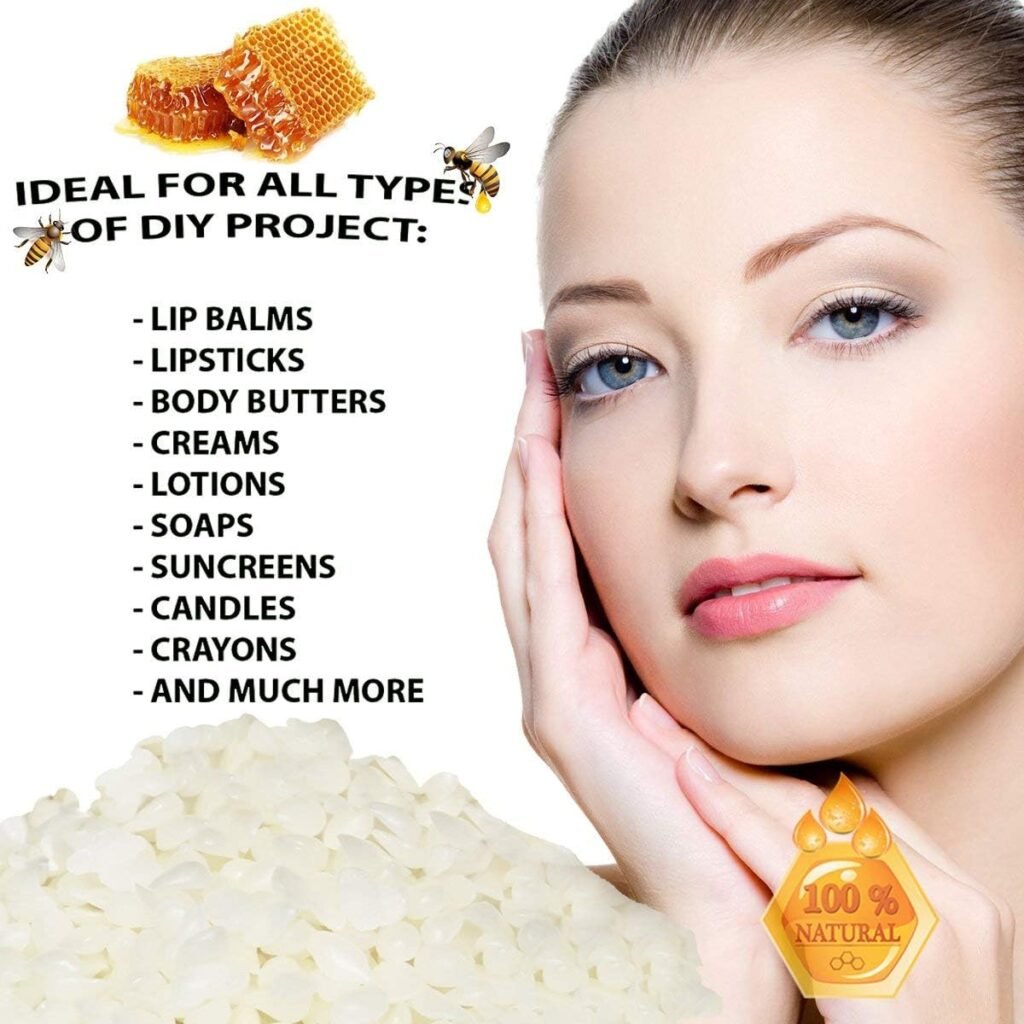Are you looking for a reliable, cosmetic-grade beeswax that fits into your skin, face, body, and hair DIY projects?
Product Overview
You’re looking at “White Beeswax Pellets 10 lb 100% Pure and Natural Triple Filtered for Skin, Face, Body and Hair Care DIY Creams, Lotions, Lip Balm and Soap Making Supplies.” This product promises premium, cosmetic-grade white beeswax in convenient pastille form, making it easier for you to measure and melt. The item notes that these are triple filtered, 100% natural, and suitable for a wide range of DIY uses from lotions to candles.
About the Brand and Quality
You’ll appreciate that this beeswax is described as premium quality and cosmetic grade, which means it’s intended for formulations that touch skin and hair. The triple-filtered process is meant to remove impurities and result in a cleaner, more consistent product you can trust in personal care recipes. The product details highlight versatility for skin care products, lotions, candle making, furniture polish, and much more.
What Comes with the Purchase
You’ll receive a 10 lb bag of white beeswax pastilles (pellets), ready to be measured and melted for your small-batch or larger DIY projects. Because the beads are uniform and easy to scoop, you’ll find them simpler to work with compared to blocks that require chopping.
Specifications Table
You’ll find the key specs laid out below so you can scan what matters most before you buy.
| Attribute | Details |
|---|---|
| Product Name | White Beeswax Pellets 10 lb 100% Pure and Natural Triple Filtered for Skin, Face, Body and Hair Care DIY Creams, Lotions, Lip Balm and Soap Making Supplies |
| Weight | 10 lb (approx. 4.54 kg) |
| Form | Pastilles / Pellets |
| Purity | 100% Natural Beeswax (claimed) |
| Filtration | Triple filtered |
| Grade | Cosmetic / Premium |
| Typical Uses | Skin care, lotions, lip balm, body butter, soap making, candle making, furniture polish |
| Scent | Mild, lightly honey-like (typical of white beeswax) |
| Color | White (bleached/processed from yellow beeswax) |
| Packaging | Bulk bag (10 lb) |
| Melt Point | ~62–65°C (144–149°F) typical for beeswax |
| Brand Positioning | Trusted brand / Top quality at an affordable price |
First Impressions
When you open the bag, the first thing you’ll notice is how convenient the pastilles are. You’ll find them easy to scoop and measure with spoons or digital scales, which saves you time and keeps projects neater. The white pellets look consistent in size and color, reinforcing the triple-filtered claim.
Feel and Handling
You’ll notice the pellets are small, smooth, and melt quickly when heated gently. Because they’re uniform, you’ll get predictable melting behavior and easier ratio calculations for your recipes. Handling is cleaner than dealing with chunks or blocks that require cutting.
Texture, Scent & Purity
You’ll sense a mild, soft honey aroma that’s common in beeswax but much subtler in the white pastilles. The triple-filtered processing reduces impurities, which also tends to mute the stronger raw-bee aroma seen in unrefined yellow beeswax. This makes the white pastilles more neutral for blends where you don’t want a strong beeswax scent.
How Pure Is It Really?
The product is marketed as 100% natural and triple filtered, so you can reasonably expect minimal contaminants and a cosmetic-grade standard. If purity is critical for your application, you should check seller documentation or request a certificate of analysis. You’ll also want to spot-check small batches to ensure the behavior matches your expectations.
Performance for Skin, Face & Body Products
You’ll find these pellets are excellent for making creams, lotions, lip balms, and body butters. Beeswax acts as an emulsifier and thickener, stabilizing oil-and-water systems, and providing a protective barrier on the skin that helps lock in moisture. Because these pellets are cosmetic grade, you can use them confidently in formulations that are meant to touch sensitive skin areas, though patch testing remains wise.
Benefits for Skin Applications
You’ll notice improved texture, body, and glide in your creams and balms when you use beeswax. It gives products structure without a heavy greasy feeling and adds a pleasant slip that helps spreads creams and balms evenly. For people with dry or chapped skin, it adds protective, occlusive properties that reduce moisture loss.
Performance for Lip Care and Facial Use
You’ll get reliable structure in lip balms and salves thanks to the predictable melting and cooling behavior of pellets. Because the white beeswax has a milder scent, it won’t compete with added essential oils or flavorings. Its soothing, protective properties make it a go-to ingredient for formulations aimed at chapped lips, dry cuticles, and gentle face balms.
Texture and Finish on Lips
You’ll appreciate a smooth finish on lips rather than a sticky one. This beeswax gives lip products stability and a pleasant tactile feel. If you want a faster melt-on-lips, you can balance it with oils that are softer at room temperature such as apricot kernel or sweet almond oil.
Performance for Soap Making & Candles
You’ll find beeswax useful in soap as a hardener and as a stabilizing agent for bars, although it’s typically used in smaller percentages than oils and lye. In candles, beeswax provides a clean burn, good scent throw, and a bright, stable flame. The white pastilles are useful if you want a cleaner-looking, less yellow candle without heavy bleaching by-products.
Working with Beeswax in Candles
You’ll notice beeswax melts and pours predictably, and the pastilles mean you don’t need to grate or chop major blocks. Beeswax candles burn longer and cleaner than many paraffin options, and the white color helps if you plan to add dyes for custom colors.
DIY Recipes and Ratios
You’ll find it helpful to have simple, reliable recipes to test this beeswax. Below are basic formulations you can scale up or down. Use a double boiler or a microwave-safe container (short bursts, stir between) to melt the pellets safely.
Simple Lip Balm (Approx. 12-15 tubes or 20 small tins)
You’ll make a very effective lip balm with this easy ratio:
- 1 part beeswax pellets
- 2 parts carrier oil (e.g., sweet almond, jojoba, or fractionated coconut oil)
- 1 part butter (e.g., shea or cocoa)
Melt together, add a few drops of essential oil or flavor, pour into containers, and allow to cool. This recipe gives you a stable balm that doesn’t feel greasy and has a pleasant sheen.
Basic Body Butter
You’ll enjoy making a whipped body butter:
- 1/4 cup beeswax pellets
- 1/2 cup shea butter
- 1 cup carrier oil (fractionated coconut, jojoba, or sweet almond)
Melt the beeswax and shea together, add the oil, cool slightly, add essential oils, whip until fluffy. This will give you a body butter with decent structure and spreadability.
Lotion Bars
You’ll make a solid lotion bar for travel-friendly moisturizing:
- 1 part beeswax pellets
- 1 part cocoa butter or shea butter
- 1 part carrier oil
Melt and pour into molds; cool and unmold. The higher beeswax ratio makes the bar firmer and longer-lasting.
Soap Additive
You’ll use beeswax as an additive:
- 1–5% of total soap recipe by weight is a common starting point.
Melt beeswax into the oils before combining with lye solution to integrate it uniformly.
Tips for Working with Pellets
You’ll find pellets much easier to measure and melt than blocks. Use a digital scale for accuracy, and always melt beeswax slowly over low heat to prevent scorching. A double boiler prevents direct heat contact and reduces the risk of burning.
Melting and Temperature Control
You’ll want to watch for temperatures around the typical melting range (~144–149°F / 62–65°C), and avoid overheating. Beeswax is flammable at high temperatures when left unattended on a direct flame; always use gentle heat, stir, and monitor closely as you work.
Safety & Allergies
You’ll treat this product as generally safe for topical use, but you should be cautious if you or your customers have bee allergies. True allergic reactions to beeswax are uncommon, but they do happen. Always perform a patch test on a small skin area before wider use, particularly for facial applications.
Sensitivities and Essential Oils
You’ll remember that essential oils can cause photosensitivity or irritation for certain skin types. Keep strong actives and fragrances within recommended usage rates and consider people with sensitive skin when formulating.
Storage & Shelf Life
You’ll store the beeswax in a cool, dry place away from direct sunlight and strong odors. Properly stored, beeswax can last several years because it is naturally stable and does not oxidize like many oils. Keep it sealed to prevent dust or debris from contaminating the pellets.
How to Keep It Fresh
You’ll seal the bag or transfer pellets to airtight containers for longer storage. Avoid storing near volatile materials like solvents or strong-smelling products because beeswax can pick up odors over time.
Packaging & Value
You’ll get a bulk 10 lb bag that represents decent value if you’re serious about DIY or small-scale production. The pastille form minimizes prep time and reduces waste. For hobbyists or small entrepreneurs, the price per ounce in bulk often beats smaller retail jars.
Is 10 lb Too Much?
You’ll consider whether 10 lb is more than you need. If you’re a casual crafter, this might be a large quantity that requires good storage planning. If you frequently make personal care products, candles, or giftable items, 10 lb is cost-effective and convenient.
Pros and Cons
You’ll want a balanced view before purchasing. Here’s a clear breakdown of likely strengths and limitations.
Pros
- You’ll benefit from cosmetic-grade, triple-filtered beeswax that’s suitable for skin and hair products.
- You’ll love the convenience of pastilles for consistent measuring and quick melting.
- You’ll value the neutral scent and white appearance that won’t overpower essential oils or colorants.
- You’ll get a good bulk value for frequent DIY use.
Cons
- You’ll need enough storage space to keep a 10 lb bag fresh and dry.
- You’ll want to confirm any specific purity or testing documentation if required for commercial production.
- You’ll have to watch for allergy considerations in users sensitive to bee products.
How It Compares to Other Beeswax Types
You’ll notice differences if you’ve used yellow beeswax or other grades. Yellow (unbleached) beeswax retains more of the natural color and scent and may contain more trace pollen or propolis. White beeswax is often processed to remove color and some odor, making it more neutral in formulations.
Cosmetic Grade vs. Industrial Grade
You’ll prefer cosmetic-grade beeswax for products that touch skin and hair because it’s processed to meet safety expectations for topical use. Industrial grades may be cheaper but can contain impurities not suitable for personal care.
Who Should Buy This Product
You’ll find this product ideal if you regularly make lotions, balms, soaps, or candles. It’s also sensible for small business owners who need a reliable supply of cosmetic-grade beeswax in a format that speeds up production. If you’re an occasional crafter, think about whether a smaller quantity would be more practical.
Ideal Use Cases
You’ll benefit most if you:
- Make lip balms, body butters, lotions, or salves often.
- Run a small bath-and-body business and need a consistent raw material.
- Make beeswax candles and want a cleaner-looking white candle base.
- Prefer the convenience of pellets over blocks.
Tips to Get the Best Results
You’ll want to calibrate your recipes when switching wax types. Even small differences in wax grade and polishing can affect final texture and firmness. Start with small test batches to find the right balance for your product’s melt profile and sensory feel.
Measuring and Melting Best Practices
You’ll weigh the pellets for accuracy, melt using indirect heat, stir to ensure uniformity, and cool at room temperature to prevent bloom or condensation issues. If you incorporate water phases in lotions, add the emulsifier and oils in the proper order and follow a tested emulsification method.
Environmental and Ethical Notes
You’ll appreciate that beeswax is a renewable, natural product derived from bees. If sustainability is important, consider asking the seller about sourcing practices. Ethical beekeeping supports bee populations and local ecosystems, and some suppliers will provide transparency about sourcing.
Is Bleached Beeswax Less Natural?
You’ll note that white beeswax typically undergoes processing to remove color; this doesn’t necessarily make it synthetic, but it is a more refined product than raw yellow beeswax. If you prioritize completely unprocessed ingredients, raw beeswax might align more with your preferences.
Frequently Asked Questions (FAQs)
You’ll find answers to common questions that come up when purchasing beeswax pellets.
Are these pellets safe for lip balms?
Yes, the product is marketed as cosmetic grade and intended for skin and lip products. You’ll still perform patch tests and follow standard formulation safety practices.
Can you use white beeswax for candles?
Absolutely—you’ll get a cleaner-looking candle with good burn quality. The white color is helpful if you plan to dye or scent candles.
How do you melt the pellets safely?
Melt slowly with indirect heat using a double boiler or a controlled, low-temperature microwave setting in short bursts. You’ll stir frequently and avoid direct open flame to reduce fire risk.
Does white beeswax smell like honey?
It has a milder honey-like scent compared to raw yellow beeswax because it’s been filtered and processed. You’ll still be able to add essential oils or fragrances without much competition from the wax scent.
How long will 10 lb last?
It depends on your usage. You’ll find it lasts a long time for personal use but is ideal for frequent makers or small business operations. Stored properly, it remains usable for years.
How to Test Quality at Home
You’ll run a few simple, practical tests: melt a small sample, check for odor, observe the color when melted and cooled, and make a tiny test product like a lip balm to evaluate texture. If it performs well in those tests, you’ll be confident mixing larger batches.
Practical Quick Tests
You’ll weigh 10 g, melt it, and combine with oil/butters in a 1:2:1 ratio for a lip balm test. This gives you an immediate sense of firmness and spread. Smell and color in the test batch will help confirm filtration and purity.
Reverse Engineering Common Recipes
You’ll find it helpful to reverse engineer commercial products: note the texture and melting profile, then adjust your beeswax and oil ratios until you match the desired feel. Because these pellets behave predictably, this process is more straightforward than with less consistent wax forms.
Example Ratio Adjustments
You’ll increase beeswax by 10–20% for firmer balms or bars; reduce beeswax by 10–20% and increase soft oils for softer, more spreadable balms. Test small batches until you find the sweet spot for your product’s intended use.
Troubleshooting Common Issues
You’ll occasionally face graininess, separation, or overly firm products. Graininess often results from cooling too quickly or not properly emulsifying water phases. Separation can occur from unstable emulsions—use a tested emulsifier if you’re adding water. Overly firm results are solved by reducing beeswax slightly or adding softer oils.
Fixes You Can Try
You’ll gently reheat and remix small batches to correct minor issues, or remelt and adjust by adding small amounts of oil or butter to change the final texture. Patience and incremental adjustments are key.
Final Verdict
You’ll find “White Beeswax Pellets 10 lb 100% Pure and Natural Triple Filtered for Skin, Face, Body and Hair Care DIY Creams, Lotions, Lip Balm and Soap Making Supplies” to be a practical, high-value option if you’re serious about DIY personal care or small-scale production. The cosmetic-grade, triple-filtered claim, and pellet form make it user-friendly and reliable in formulations.
Who Should Definitely Buy It
You’ll want this if you make lip balms, lotions, body butters, soaps, or candles regularly and want a consistent, neutral beeswax that’s easy to measure and melt. If you run a small business or make large batches for gifts, the 10 lb size is particularly economical.
Buying Tips
You’ll compare prices per ounce against smaller packaging to confirm value. If you need certification for commercial sale, contact the seller for documentation. Also, consider the frequency of your use and storage options before committing to a 10 lb bag.
What to Ask the Seller
You’ll ask about sourcing, filtration details, and any certificates of analysis if transparency and testing are important for your business. You’ll also confirm shipping protection for the bulk bag to avoid contamination.
Final Notes and Encouragement
You’ll find beeswax a versatile and satisfying raw material that improves the stability and feel of many formulations. This 10 lb white pellet format gives you convenience and value, while the cosmetic grade and triple filtration provide the confidence to use it on the face and body. If you take basic safety precautions and run small tests first, this product can become a dependable mainstay in your DIY toolkit.
Disclosure: As an Amazon Associate, I earn from qualifying purchases.
